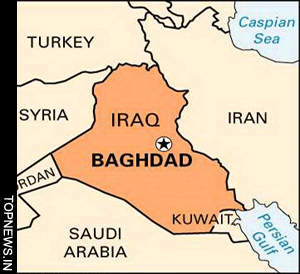At least 17 killed in Baghdad bomb attacks
 Baghdad - At least 17 people were killed in two car bomb attacks in the predominantly Shiite Baghdad neighbourhood of Sadr City, the satellite news network al-Arabiya reported Wednesday.
Baghdad - At least 17 people were killed in two car bomb attacks in the predominantly Shiite Baghdad neighbourhood of Sadr City, the satellite news network al-Arabiya reported Wednesday.
It was the latest in a series of deadly attacks targeting Shiite Muslims in Iraq. Suicide bombers killed more than 120 people over the space of two days last week.
In Mosul, some 400 kilometres north of Baghdad, police found the body of a beheaded girl in the city's eastern district of al-Karama, police there told the German Press Agency dpa on Wednesday.
In the eastern Mosul neighbourhood of al-Mathna, "unknown gunmen" fatally shot a police officer in his house, police said.
The recent in rise in violence across across the country prompted the head of Iraq's tribal council, an influential body gathering the Sunni Arab tribes of Iraq, to call for the dismissal of Iraq's interior minister.
Baghdad's Buratha news agency on Wednesday reported that Ali Hatem, the leader of the Sunni, Arab al-Dulim tribe and the head of the council of Iraqi tribes, called on the government to fire Iraqi Interior Minister Jawad al-Bulani "following a deterioration in the security" of Iraq's Sunni heartland in al-Anbar province and the rest of the country.
Hatem accused al-Bulani, who once belonged to Shiite cleric Moqtada al-Sadr's movement, of being more interested in politics than in the security of the country, Buratha reported. Al-Bulani founded the Iraqi Constitutional Party in 2005, but resigned as its leader after becoming Minister of Interior a year later.
"Since he became head of the party, the minister is more interested in the affairs of his party. He is exploiting his ministerial position for political gains," al-Bulani said in remarks published by Buratha Wednesday.
The call from the leader of Iraq's Sunni Arab tribes came amid strained relations between the Iraqi government, now dominated by Shiites and Kurds, and the "Sahwat," or "Awakening" councils, Sunni militias enticed to fight insurgents.
Militiamen in Abu Ghraib, west of Baghdad, left their posts on Thursday, following their leader's resignation after four of his bodyguards, including his son and nephew, were arrested.
In late March, the US military passed control of the Awakening Councils to the government of Iraq.
In the weeks running up to the transfer, Iraqi security forces began arresting members of the Sahwat, charging that they were insurgents and supporters of the former ruling Baath party.
Clashes broke out in the Baghdad slum of Fadhil when Iraqi security forces arrested Adil al-Mashhadani, the head of the Sahwa.
It took Iraqi soldiers, backed by US troops, two days to quell the uprising that followed. At least 15 people were killed in the fighting, and security forces acknowledged that hundreds may have escaped with their weapons. (dpa)